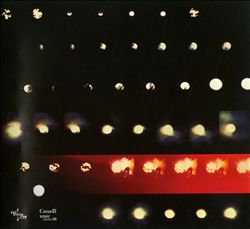You get the feeling that there are two forces at play throughout the record, a desire to distil the absolute essence of what is so beautiful about Middle Eastern music, balanced against a willingness to completely fuck about with its structures by introducing new and alien elements.
You get the feeling that there are two forces at play throughout the record, a desire to distil the absolute essence of what is so beautiful about Middle Eastern music, balanced against a willingness to completely fuck about with its structures by introducing new and alien elements.

(Constellation Records) http://www.konkurrent.nl
Now this is a truly interesting release: a meeting of minds to create something unique, dare I say a little bit crazy, despite the serene nature of the music? And despite the often dulling nature of how to describe or promote it? Let’s quickly quote the press release.
“JIMH forges a modern experimental Arabic music by wedding melismatic singing in classic Arabic styles and electronic compositions with contemporary electronic production.”
Now, these kinds of pronouncements can sound incredibly portentous and often better than the musical sum of their parts. It can all sound a bit worthy. And when you hear that it’s the work of a Lebanese producer, a French producer, a visual artist from Chile it all sounds like boxes are being ticked.
Further info reveals…
“The numeral 7 is pronounced like an h; all titles on the album are rendered in contemporary colloquial “mobile” Arabic (the transliterative characters used in Arabic phone texting).”
Sounds as if you are setting yourselves up for a fall here lads…
OK, sarcasm aside: you do need a bit of patience to soak what JIMH have made, as it can pass you by at first listen. But once you are familiar with its contours you will start to appreciate that this is often a brilliant record, evocative, unearthly and not something that can be easily categorised. I know people always say that they are “defying categorisations” but Mo7it Al-Mo7it, despite its obvious inspirational wellspring, really does take the listener somewhere else, somewhere unexpected.
You get the feeling that there are two forces at play throughout the record, a desire to distil the absolute essence of what is so beautiful about Middle Eastern music, balanced against a willingness to completely fuck about with its structures by introducing new and alien elements. Speak of The Woman I The Black Robe and Sick Diseased, Goat are takes on melismatic laments that also boast electronic dirges that aren’t that far away from a post punk / early industrial soundtrack. It’s incredibly powerful. We also have He Titillates The Shepherd but Not The Sheep, which is a similar fusion where a spacey and groovy keyboard sets up a twinkling backdrop to some uncompromising vocals.
Elsewhere we get a lesson in how good simple concepts can sound: Nightingale of the Euphrates is just that; a sample of the bird’s song over a sample of running water, set off by a Virginal. Oh Tear of the Eye 3 is similar in that a bird reappears but is soon overtaken by an increasingly elaborate and intricate jam between a harp and what I think is a Buzuk. This mosaic of patterned jamming, (albeit more pressured, shinier, and synthesized), carries on with the Buzuk seemingly utilising some kind of amp and sequencers on Eyeliner of The Eye, Blindness of the Eye. It could be something Popol Vuh conjured up. Finally Amanem is a call to a musical prayer, a stonking, all-encompassing 8 minute odyssey that just does not drop in intensity at any point.
A fabulous record. Really, give this some time.
